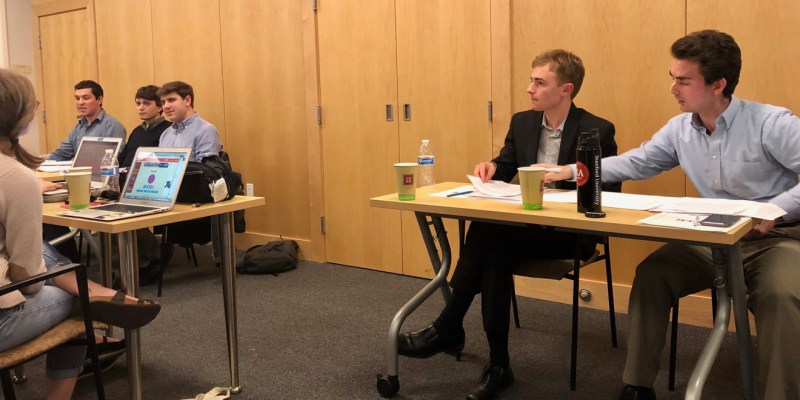On Wednesday night, the Stanford Democrats and the Stanford College Republicans debated the Congressional Tax Cuts and Jobs Act of 2017. The federal debt-to-GDP ratio, the university endowment tax and the corporate tax reduction were addressed in the debate hosted by Stanford in Government (SIG), Stanford Women in Politics (SWIP), Stanford Politics, the Stanford Review and the Stanford University Speakers Bureau (SSB).
The Tax Cuts and Jobs Act of 2017, first introduced Nov. 2, was passed Dec. 22, 2017. The legislation includes a reduction in the corporate tax rate from 35 percent to 21 percent. Another key point included an increase in the child tax credit from $1000 to $1600.
The legislation would also impose an excise tax on universities with endowments exceeding $25 billion and with at least 50,00 full-time students.
The Stanford College Republicans, represented by Christos Makridis, a Ph.D. candidate in economics and management science and engineering, and Philip Eykamp ’20, expressed support for the corporate tax cut, saying that it would catalyze GDP growth, leading to a reduction in the debt-to-GDP ratio as well as growth in wages for workers.
“The way we increase growth is by giving people more opportunities to work. And the way we are going to solve the deficit problem in the United States is not by taxing more, but by getting GDP growth up,” Makridis said.
The Stanford Democrats, represented by Gabe Rosen ’18, Matthew Wigler ’19 and Caleb Smith ’17 M.A. ’18 expressed concerns about the beneficiaries of the Tax Cuts and Jobs Act, saying that it would primarily benefit the top income earners in the United States and augment income inequality.
“As a whole, the complete package is not going to provide substantive benefits in the long run for the working and middle classes,” Rosen stated. “Due to these unfunded liabilities [such as] the repeal of the individual mandate in the Affordable Care Act, we are only going to pass the burden onto the very classes that this bill is purporting to help.”
The Stanford College Republicans argued that the corporate tax cut would allow firms to allocate their funds more optimally, potentially allowing for increases in spending on research and development (R&D) or raising workers’ wages.
“When corporate tax rates get reduced, it allows for companies to optimally allocate their money in much more efficient ways,” said Makridis, citing a 2010 paper by Kevin Hassett, Chairman of the Council of Economic Advisers. “Whenever the corporate tax rate gets reduced by one percentage point, about three to four dollars goes up in terms of real wage growth for the average worker.”
The Stanford Democrats expressed concern that the imposition of a tax would impact university endowments and corporate tax cuts, noting that universities are also crucial incubators for research and development.
“Why is it that it’s okay for universities with billions of dollars in assets to be able to afford an increase in their tax burden, but that logic doesn’t seem to extend to the trillion-dollar corporations who have huge magnitudes of assets on them?” Rosen asked.
The event was followed by a discussion forum in which audience members asked questions and participated in discussion. The forum centered around the reforms in the Child Tax Credit in the Tax Cut and Jobs Act, as well as additional discussion about the endowment tax exacted by the legislation.
Contact Karen Kurosawa at karen16 ‘at’ stanford.edu.
An earlier version of this article incorrectly stated the name of debate participant Caleb Smith. The article also misstated that the Tax Cuts and Jobs Act of 2017 reduced the number of tax brackets from seven to four. In fact, there are still seven individual tax brackets. Additionally, a prior version of the article misstated that the legislation eliminated the student loan interest deduction and introduced a tax on graduate student tuition waivers. In fact, these proposals were not implemented. The Daily regrets these errors.
